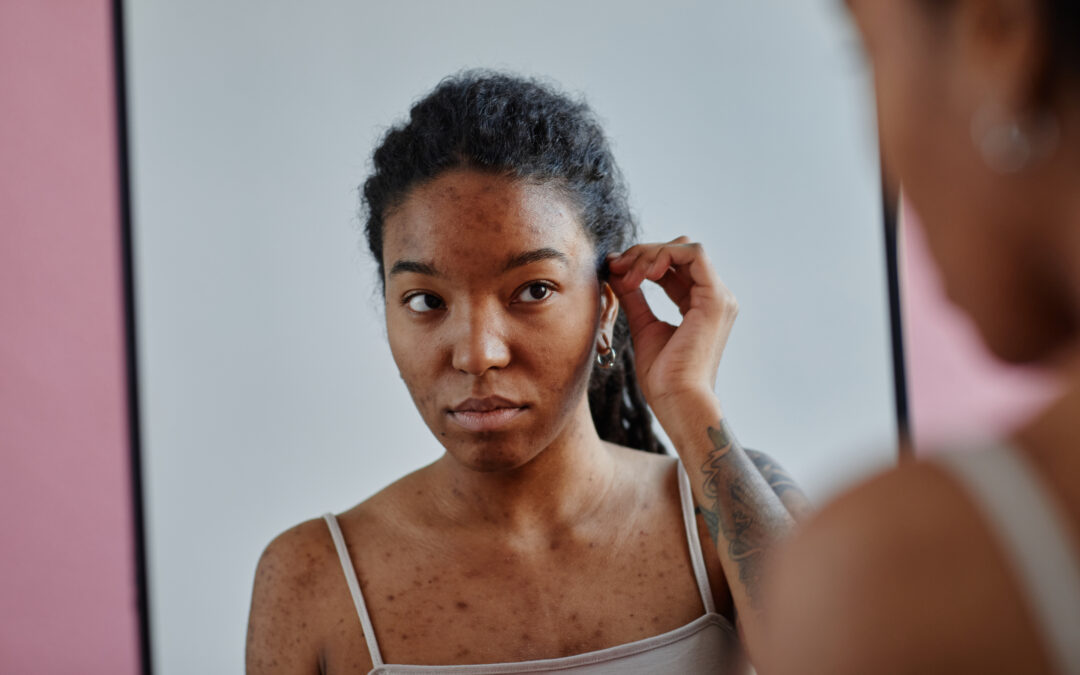Have you ever struggled with how you feel about your body? It can be tough, especially when we’re bombarded with images of “perfect” bodies all around us. But the good news is that with time and practice, we can learn to accept ourselves just the way we are.
In this blog, we’re going to dive into the world of body image, exploring what it is, the four different aspects, and we’re going to break down 5 common misconceptions. Come join us on this journey towards body acceptance!

Table of Contents
What is body image?
Body image refers to how you see and feel about your physical body, as well as how you believe others perceive your body. It’s the mental image you hold of your body’s shape, size, and appearance, as well as your thoughts and emotions about your body. This can be influenced by a variety of factors, such as societal norms and expectations, cultural beliefs, personal experiences, your own thoughts and emotions, and more.
A positive body image is when a person is able to accept, appreciate and respect their body. This can lead to greater self-confidence, improved relationships, and a more fulfilling life.
Conversely, negative body image is when someone thinks and feels badly about their body constantly. Body dissatisfaction is a mental and emotional process that happens inside of you, but it can be affected by things outside of you, like pressure to meet a certain appearance ideal (which makes sense, because the society we live in praises thinness). People who are unhappy with their bodies may be more likely to engage in disordered eating habits. This places them at heightened risk for developing an eating disorder.
What are the four aspects of body image?
Did you know there are four parts to our body image? By breaking each part down and considering each separately, we can get a clearer picture of our body image and start to think about ways to improve it. So, let’s explore each of these aspects and see how we can strengthen our relationship with our bodies:
Perceptual body image: This is how you perceive your body. This is not always a true representation of how you appear although it might seem that way.
Affective body image: This is the way you feel about your body. Feelings can range from happiness to hatred, but are frequently summarized as the level of satisfaction or dissatisfaction you have with your shape, weight, and individual body parts.
Cognitive body image: This is the way you think about your body. This can result in a preoccupation with body shape and weight.
Behavioral body image: This consists of the behaviors you engage in as a result of your body image. When a person is unhappy with their appearance, they may isolate themselves or engage in unhealthy behaviors to change their appearance.

To learn more about body image, we also highly recommend exploring this article by the National Eating Disorders Collaboration!
Common misconceptions about body image
In order to understand what body image is, we must also know what it is NOT. Below are some of the most common misconceptions about body image that we often hear from our clients.
- Body image is NOT always an accurate representation of your physical being. Body image refers to the way that a person perceives their own body, which may or may not be an accurate reflection of their actual physical appearance.
- Body image is NOT static, it changes from day to day or even moment to moment. How you view your body can change at any time due to a variety of factors, both internal and external. External factors that can impact a person’s body image include cultural and societal expectations, media and advertising, and social interactions with others. Internal factors, such as mood, physical health, and personal experiences, can also affect body image.
- Body image is NOT directly related to confidence. Confidence refers to a person’s belief in their own abilities and self-worth, while body image specifically relates to a person’s perceptions of their physical appearance. It’s possible for a person to have high confidence in areas such as their work, relationships, or skills, but struggle with negative body image or low body confidence. Similarly, a person with a positive body image may still experience low confidence in other areas of their life.
- Body image is NOT the same as self-esteem. Self-esteem refers to a person’s overall sense of self-worth and self-acceptance, whereas body image, as mentioned above, specifically relates to a person’s perceptions of their physical appearance. A person may have high self-esteem but still struggle with body image issues.
- A positive body image is NOT loving yourself 24/7. Having a positive body image does not mean that a person loves every aspect of their body all the time (we ALL have poor body image days). Instead, it means accepting and appreciating their body for what it is and recognizing that their self-worth is not solely determined by their physical appearance. A person with a positive body image may still have moments of self-doubt or negative thoughts, but they are able to cope with these feelings in a healthy way and maintain a generally positive outlook on their body.
We have the ability to change how we see, feel, and think about our bodies. If you need more support on healing your relationship with your body, you can apply to work with us here!






0 Comments